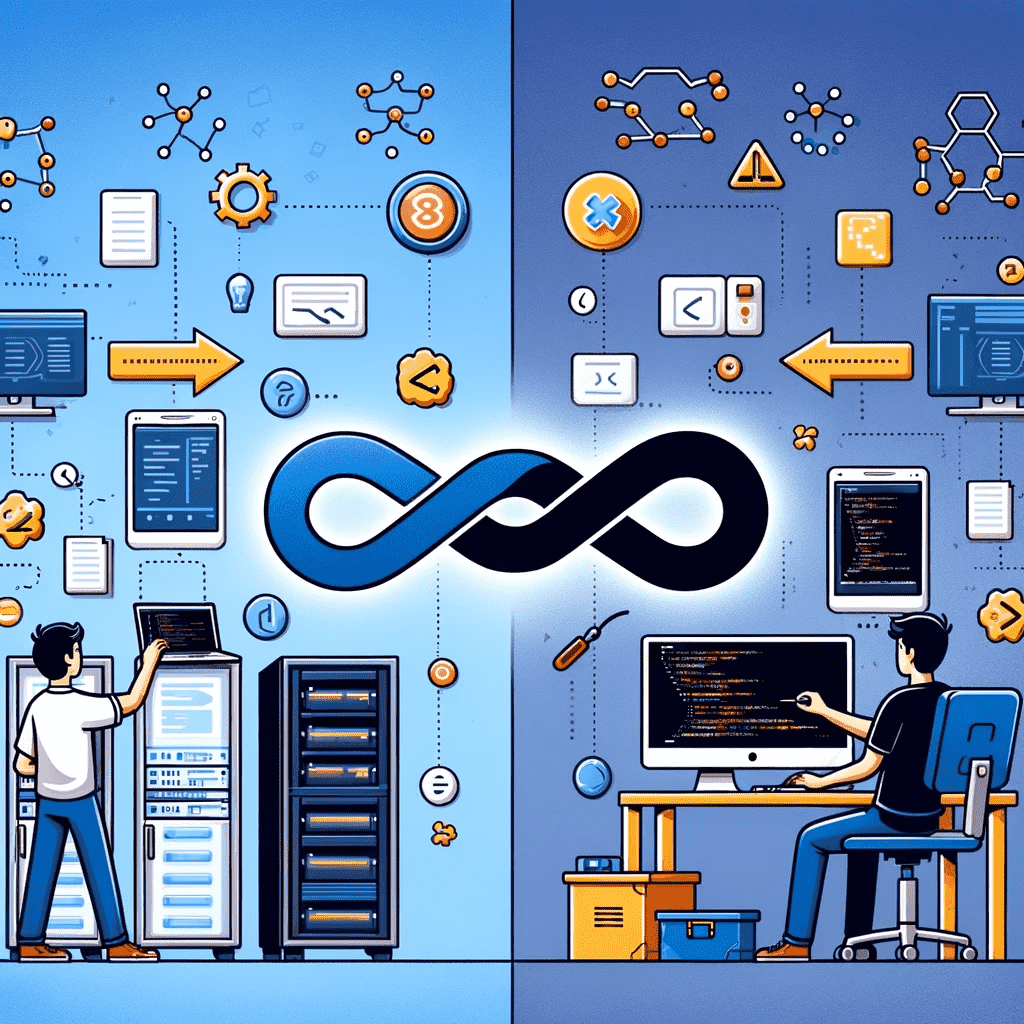The DevOps vs. Developer Dilemma: Choosing the Right Engineer Ratio for Your Team
Choosing the right team of engineers plays a pivotal role in product success. Striking the right balance between DevOps engineers and software developers can seem like a daunting task, but understanding their roles, responsibilities, and benefits can facilitate that decision.
In this article, we delve into the nuances of DevOps vs Developer roles and help you understand how to make the best investment for your team.
What's the Difference Between a DevOps Engineer and a Developer?
DevOps engineers and software developers (sometimes called software engineers, programmers, coders, SWEs) form the backbone of software development teams. Intersectionality exists but each profession harnesses distinctive roles, responsibilities, skills, and abilities which we will differentiate in this segment.

DevOps job titles can vary greatly, while work may be similar
Common DevOps Job Titles: Infrastructure Engineer vs DevOps Engineer vs Systems Engineer
DevOps can encompass many similar roles, some that are more-or-less interchangeable and others with subtle differences. DevOps-related roles often include the following:
Build/Release Engineer
Release Manager
Automation Engineer or Architect
Cloud Engineer
Security Engineer
Cloud Systems Administrator
Infrastructure Engineer
Systems Engineer
System Administrator (Sysadmin)
AWS / GCP / Azure Engineer
Observability Engineer
FinOps Consultants
The biggest distinctions among DevOps roles are between Platform, SRE, Cloud, Build Release, FinOps, and "traditional" DevOps engineers. DevOps emphasizes collaboration and automation, while Platform Engineers create scalable infrastructure. SREs prioritize reliability, Cloud Engineers leverage cloud platforms, and Build Release Engineers streamline development cycles. FinOps consultants align cloud usage with budgetary goals.
These roles, though interconnected, bring specialized focus to optimize modern IT ecosystems for efficiency and reliability.
Read More: The Top DevOps and Cloud Conferences to Attend in 2024
Role and Responsibility: DevOps Engineer vs Software Developer
A DevOps engineer focuses on the development and maintenance of software release systems, collaboration with the software development team, aligning with industry standards, and employing DevOps tools. On the other hand, a software developer's role concentrates on building scalable software applications, coding, integrating data services, testing, and debugging.
Does Full Stack include DevOps?
While Full Stack developers handle the complete development process, many are expanding their skills to include DevOps practices. However, DevOps is a broader scope that needs a shift in mindset, not just skills, to achieve operational success.
DevOps vs Full Stack Developer: Spotting Key Differences
While both roles may seem similar, the key difference lies in scope. Full Stack developers handle the front and backend software development along with deployment, while a DevOps engineer has an overarching role that includes creating, testing, deploying, and managing an application's infrastructure and operations while using DevOps tools and cloud systems.
Dev vs DevOps: Breaking Down the Skill Set required
While developers specialize in languages like Java, DevOps professionals master web and cloud services such as AWS, GCP, and Azure, while also being familiar with various programming languages (most commonly Python, Javascript, Java, and Ruby). Their training goes beyond software engineering to include system operations, making them adept at managing CI/CD pipelines and understanding cloud operations better.
DevOps engineers and software developers have different functions
DevOps Engineer vs Developer: Who Builds and Operates Better?
The answer to this question depends on the need of the project. Developers build software applications while DevOps engineers optimize the software development process using cloud services, agile methodologies, and advance QA techniques making the operations seamless and error-free.
Difference between DevOps and Software Development Team
The significant difference between Cloud Engineers vs Software Engineers is their functions. A software development team is focused on building software applications, while a DevOps team emphasizes automating the software development process, enhancing collaboration between development and operations, and maintaining the application environment for continuous deployment and improvement.
Unpacking the DevOps Culture: What Does DevOps Really Mean?
DevOps culture is more than a fusion of development and operations. It involves shared responsibility, seamless communication, continuous learning and improvement, automation, and integration of tools. Here's looking at what this means.
Responsibility and Operations in a DevOps Culture
In a DevOps culture, responsibility is shared. DevOps engineers are responsible for not just application development and deployment, but for system operations, standardizing deployments, setting up automation processes, handling security, and monitoring application performance.
Who does DevOps Report to?
Organizational structure dictates who DevOps Engineers reports to, but ideally, they collaborate directly with different stakeholders including development, infrastructure, IT operations and security teams, ensuring the smooth functioning of software applications from conception to delivery.
How DevOps Changes the Software Development Process
By deploying agile methodologies and automating manual tasks, DevOps has revolutionized the software development process. Changes include Continuous Integration and Continuous Deployment (CI/CD), automated testing, microservices architecture, and cloud adoption, that ensure the pipeline is efficient and updated.
Mastering DevOps Tools for Optimal Product Development
DevOps tools like Docker, Jenkins, Kubernetes improve product lifecycle management by optimizing various aspects such as version control, testing, integration, deployment, and monitoring. Mastering these tools allows for efficient product development and helps maintain product reliability and speed.
DevOps Culture: Nurturing Success and Continuous Improvement
DevOps builds a culture of continuous improvement, rapid feedback, and high software quality. Nurturing this culture in your team can significantly enhance the efficiency of your software development process and promote successful outcomes.
Evolution and Future Trends in DevOps Culture
DevOps has evolved dramatically over the years, focusing more on automation and cloud services. Future trends indicate a move towards AI-assisted DevOps (AIOps), wider adoption of microservices, and increased focus on security (DevSecOps).
Weigh the pros and cons of the tech talent to hire for your team
Pros and Cons of Hiring a DevOps Engineer Vs A Developer
Everything has its pros and cons. Deciding on whether to hire a DevOps engineer or a software developer will depend on evaluating these trade-offs.
Why Hire a DevOps Engineer? Pros and Benefits
DevOps engineers bring with them a rich set of benefits such as increased deployment frequency, less complexity, reduced failure rate of new releases, improving productivity and work culture. They are the driving force behind Continuous Integration & Deployment, making it a compelling role.
Challenges and Risk Factors in Hiring DevOps Engineers
Despite their strengths, hiring DevOps engineers can be challenging. The expertise required, the shortage of skilled professionals, salary expectations, and investment in training can make hiring difficult.
The Hiring Dilemma: Full Stack Developers vs DevOps Engineers
Full stack developers can handle the entire development pipeline from ideation to deployment, but the operations and agility that DevOps engineers bring to the table is unmatched. The choice between the two comes down to specific company and project needs.
How DevOps Engineers Also Benefit Software Development Teams
DevOps engineers bring systematic efficiency, orchestrate better scalability with automation, ensure consistency across environments, and offer accelerated time to market – benefits that can significantly enhance the performance of your software development teams.
Finding the Balance: Developers Vs DevOps in the Cloud
The cloud has revolutionized how developers and DevOps engineers contribute to app development. Here's a look at how they handle cloud operations and the role they play.
The Role of DevOps Engineers in Cloud Operations
DevOps engineers play a significant role in cloud operations - formulating and executing cloud strategies, selecting appropriate DevOps tools, managing cloud deployments, ensuring security, and enabling scalability. Adopting the cloud has led to greater collaboration between teams and enhanced software delivery efficiency.
Cloud Development: How Developers and DevOps Contribute
While developers build cloud-ready applications, DevOps engineers ensure these built applications are effectively deployed and managed in the cloud, making their contribution to cloud development invaluable. Together, they make cloud projects agile, robust, and successful.
Cloud Migration: DevOps vs Software Developers
Both roles actively contribute to cloud migration. Software developers redesign applications to be cloud-friendly, while DevOps engineers take the existing software development process and enhance it to seamlessly fit the cloud architecture, thereby enabling smooth migration while minimizing downtime.
Software Development in the Cloud: The DevOps Advantage
A major advantage of DevOps in cloud development is its ability to automate procedures, quicken releases, bring agility, and maintain high-quality standards. The nature of cloud demands enhanced collaboration and rapid deployment – a key facet of the DevOps methodology.
Full Stack Developers and DevOps: Collaboration in the Cloud
Full Stack developers build and deploy applications in the cloud while DevOps engineers ensure collaborative, seamless, and automated cloud operations. When both roles come together, they deliver a highly efficient, resilient, and successful cloud project.
What are the right skills and training to become a DevOps engineer?
How to be a DevOps: Can Your Engineers Gain These Skills?
Transitioning to a DevOps role requires a blend of technical prowess, continuous learning, and an adaptable mindset. With the right training and skill development, engineers can successfully make this transition.
Cloud DevOps Engineer Skills
Understanding of Cloud Infrastructure: A fundamental requirement for Cloud DevOps engineers is a thorough understanding of cloud services and infrastructure, such as AWS, Azure, or Google Cloud. This involves knowing how to manage, deploy, and scale applications in the cloud.
Proficiency in Automation and Scripting: Automation is at the heart of DevOps. Skills in scripting languages like Python, Bash, or Ruby are essential for automating deployment and other processes.
CI/CD Pipeline Management: Knowledge of Continuous Integration and Continuous Deployment (CI/CD) pipelines is crucial. This includes using tools like Jenkins, GitLab CI, or CircleCI to automate the testing and deployment of code.
Containerization and Orchestration: Familiarity with container technologies like Docker and orchestration tools like Kubernetes is vital for creating scalable and efficient DevOps workflows.
Monitoring and Logging: DevOps engineers must be skilled in monitoring the performance of applications and infrastructure. Proficiency in tools like Prometheus, Grafana, and ELK Stack is important for this aspect.
Security Best Practices: Understanding of DevSecOps principles, including incorporating security into the software development lifecycle, is a key skill for DevOps engineers.
Training and Skill Development for Aspiring DevOps Engineers
If you're wondering if your engineers can learn and transition to become DevOps, there are certain skills and training they would require.
Formal Education and Training: Many online courses and certifications, like AWS Certified DevOps Engineer or Kubernetes Certification, can provide foundational and advanced knowledge. To make ensure engineers have sufficient knowledge to handle DevOps processes, we recommend using DevOps assessments to evaluate their skills.
Hands-On Experience: Practical experience is crucial. Encourage engineers to set up their own CI/CD pipelines, work with cloud services, and deploy applications in a controlled environment.
Regular Workshops and Tech Talks: Hosting or attending workshops and tech talks can keep engineers updated with the latest trends and best practices in DevOps.
Mentorship Programs: Pairing up aspiring DevOps engineers with experienced mentors can facilitate a smoother learning curve and provide guidance on industry-specific challenges.
Read More: The Best DevOps Bootcamps in 2024
DevOps Scope
DevOps covers a wide array of skills including coding, scripting, configuration management, infrastructure management, CI/CD methodologies, and a deep understanding of cloud services. Gaining these skills could open up greater opportunities for your engineers to support your website and cloud infrastructure.
What's the right ratio of talent for your tech team?
DevOps Statistics for Your Team
How Many DevOps Should Your Company Have?
The number of developers in a startup or small and medium business (SME) can vary based on the size and specific needs of the organization. According to FasterCapital, startups typically need between one and four developers. On the other hand, large enterprises may hire tens of thousands of tech roles, the majority being developers, as well as a large amount of DevOps engineers.
The role of a developer in a startup can vary significantly based on the size and type of the startup. In smaller startups, developers may be responsible for all aspects of software development, while in larger companies, developers may specialize in specific areas such as website development, database administration, or software development tools.
DevOps to Engineer Ratio
The ideal Developer to DevOps engineer ratio is 5:1, and in large software organizations like Google, the ratio is 6:1. Large start-ups, can have a Developer to DevOps ratio as high as 15:1, however it is not recommended to have insufficient cloud and infrastructure support.
How Many DevOps Engineers are There Per Company?
Google has approximately 27,000 software engineers, and their 6:1 Developer to DevOps ration means they are estimated to have at least 4,500 DevOps engineers. Amazon employs over 36,000 software engineers, and likely has over 6,000 DevOps roles.
The Costs of Putting Together a Tech Dream Team
Data from the Stack Overflow Developer Survey 2023 highlights the competitive salaries reported by developers, with Cloud Engineers and Site Reliability Engineers topping the list in the United States.
Hire DevOps Engineers or Software Developers: Salary and Demand Statistics
While salary is always a consideration, both DevOps engineers and software developers bring substantial value to an organization. According to Gartner, the demand for both roles is expected to grow. Based on the scope and nature of work, choose a role that offers optimal value.
DevOps vs Software Engineer Salary
Software engineers can be considered a part of numerous roles and vary greatly, so for this number, we looked to Indeed and Glassdoor, and found an average salary of $117,000 in the US in 2023. From these same statistics, we discovered that DevOps engineers reportedly earned an average salary ranging from $125k to $133k in the US in 2023.
DevOps vs Backend Salary
The average salary for a back end developer is a whopping $157,092 per year in the United States (2023), according to Indeed, and $147,662 according to ZipRecruiter estimates.
DevOps Engineer vs Full Stack Developer Salary
The average salary for a full stack developer in 2023 ranges from $124,943 per year in the United States, to $134,771.
Is DevOps Adoption Worth it?
Adopting DevOps practices can be a significant decision for any organization. It involves integrating development and operations teams to improve collaboration, increase efficiency, and automate processes. Before making this transition, it's essential to weigh the potential benefits against the cost of hiring DevOps engineers or DevOps engineering service providers.
Pros and Cons of DevOps for Your Team
Pros:
Enhanced Collaboration: DevOps fosters a culture of collaboration and communication between developers and operations teams, leading to more cohesive and efficient workflows.
Increased Efficiency: Automation of repetitive tasks and streamlined processes lead to faster development cycles and quicker deployment.
Improved Quality: Continuous integration and continuous delivery (CI/CD) ensure frequent testing, reducing the likelihood of major issues and improving the overall quality of the software.
Better Customer Satisfaction: Faster deployment of features and fixes means improved customer experiences and quicker response to market demands.
Cons:
Initial Implementation Challenges: The shift to DevOps can require significant changes in culture and processes, which might be challenging initially.
Training and Skill Development: Teams may require training to adapt to new tools and practices, involving time and financial investment.
Hiring Risks: DevOps engineers take care of some of the most vulnerable parts of your infrastructure - make sure you hire a high-quality DevOps (we recommend using DevOps assessments to hire the right candidates!).
DevOps can lead to success in some instances
DevOps Success Stories
Many companies have successfully adopted DevOps, leading to remarkable improvements in their operations. For example, Netflix's implementation of DevOps practices has enabled them to manage massive deployments efficiently across a global infrastructure.
Another success story is Etsy, which transformed from lengthy deployment cycles to deploying more than 50 times a day, significantly enhancing their ability to respond to market needs.
DevOps Engineering Services
For companies looking to transition to DevOps but lacking in-house expertise, DevOps engineering services can be invaluable. These services typically offer:
Assessment and Planning: Evaluating your current IT infrastructure and processes to create a tailored DevOps adoption strategy.
CI/CD Pipeline Setup: Establishing continuous integration and deployment pipelines to automate the software release process.
Cloud Infrastructure Management: Assisting in managing and optimizing cloud resources.
Monitoring and Logging: Implementing monitoring tools for better visibility into the performance and health of applications and infrastructure.
Security Integration (DevSecOps): Incorporating security practices into the DevOps workflow to ensure secure software development.
Training and Support: Providing training and ongoing support to help teams adapt to DevOps practices.
DevOps engineering services can act as a bridge, helping your team to smoothly transition to DevOps practices while minimizing disruptions to your current operations.
Final Word
Determining the right mix of DevOps engineers and developers is crucial for optimizing your team's performance and achieving project success. The choice depends on understanding the distinct roles, skills, and contributions of each.
Balancing these roles ensures a comprehensive approach to software development, from creation to deployment, fostering a culture of innovation, efficiency, and quality in your team's work.









